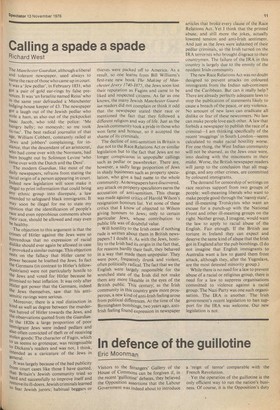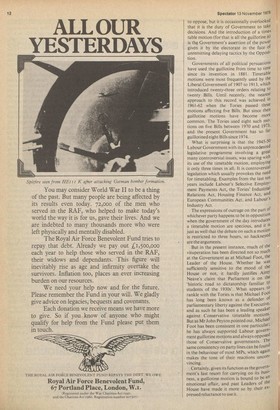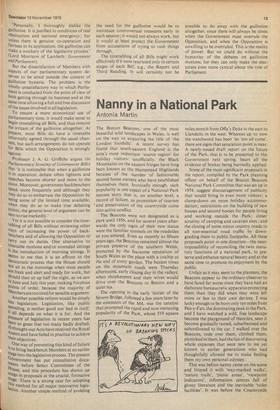In defence of the guillotine
Eric Moonman
Visitors to the Strangers' Gallery of the House of Commons can be forgiven if, in the recent 'guillotine' debates, they believed the Opposition assertions that the Labour Government was indeed about to introduce a 'reign of terror' comparable with the French Revolution.
Yet the operation of the guillotine is the only efficient way to run the nation's business. Of course, it is the Opposition's duty to oppose, but it is occasionally overlooked that it is the duty of Government to take decisions. And the introduction of a timei table motion (for that is all the guillotine is) is the Government's assertion of the power given it by the electorate in the face of unremitting delaying tactics by the Opposition.
Governments of all political persuasions have used the guillotine from time to time since its invention in 1881. Timetable motions were most frequently used by the Liberal Government of 1907 to 1913, which introduced twenty-three orders relating to twenty Bills. Until recently, the nearest approach to this record was achieved in 1961-62 when the Tories passed three
motions affecting five Bills. But since then guillotine motions have become more common. The Tories used eight such mo-. lions on five Bills between 1970 and 1973, and the present Government has so far
guillotined eight Bills since 1974.
What is surprising is that the 1945-50 Labour Government with its unprecedented legislative programme involving a great many controversial issues, was sparing with its use of the timetable motion, employing it only three times in all. It is controversial legislation which usually provokes the need for timetabling. Examples from the last ten years include Labour's Selective EmploYment Payments Act, the Tories' Industrial Relations Act, Housing Finance Act, and European Communities Act, and Labour s Industry Act.
The expressions of outrage on the part of whichever party happens to be in opposition when the government of the day introduces a timetable motion are specious, and it is just as well that the debate on such a motion is restricted to three hours, so hackneyed are the arguments.
But in the present instance, much of the vituperation has been directed not so much at the Government as at Michael Foot, the Leader of the House. Whether he was sufficiently sensitive to the mood of the House or not, it hardly justifies AireY Neave's claim that Parliament is on the 'historic road to dictatorship familiar to students of the 1930s'. What appears to rankle with the Tories is that Michael Foot has long been known as a defender of parliamentary liberty against the Executive. and as such he has been a leading speaker against Conservative timetable motions. But as Mr John Peyton pointed out, Michael Foot has been consistent in one particular: he has always supported Labour government guillotine motions and always opposed those of Conservitive governments. The same consistency on party lines can be found in the behaviour of most MPs, which again makes the tone of their reactions unconvincing.
Certainly, given its function as the government's last resort for carrying on its buSiness, a guillotine motion is bound to be an emotional affair, and past Leaders of the House have made it more so by their expressed reluctance to use it. 'Personally, I thoroughly dislike the guillotine. It is justified in conditions of real Obstruction and national emergency; but unless there is genuine co-operation and fairness in its application, the guillotine can Make a mockery of the legislative process.' (Lord Morrison of Lambeth : Government and Parliament).
But the dissatisfaction of Members with aspects of our parliamentary system deserves to be aired outside the context of guillotine hysteria. The problem is the Wholly unsatisfactory way in which Parliament is conducted from the point of view of both getting through its business and at the same time allowing a full and free discussion of the issues involved in all legislation.
To ensure a more economical use of Parliamentary time, it would make sense to begin timetabling all Bills, and thus remove the irritant of the guillotine altogether. At Present, most Bills do have a timetable informally agreed through the usual channels, but such arrangements do not operate for Bills which the Opposition is strongly against.
Professor J. A. G. Griffiths argues (in Parliamentary' Scrutiny of Government Bills) that 'it is noticeable that when a guillotine is in operation, debate often tightens and speeches become shorter and more to the Point. Moreover, government backbenchers sneak more frequently and although they May do so to embarrass the Opposition by Using some of the limited time available, When they do so to make true debating Points, the general level of argument can be seen to rise markedly.'
Yet it is not possible to consider the timetabling of all Bills without reviewing other Ways of increasing the power of backbenchers and of allowing the Opposition to carry out its duties. One alternative to timetable motions and/or extended sittings is the introduction of morning sittings. It seems to me that it is an affront to the democratic process that the House should not sit in the mornings when most people are fresh and alert and ready for work, but should then sit up half the night, as we saw
June and July this year, making frivolous Points of order, because the majority of Mem bers are too tired for sensible argument.
Another possible reform would be simply less legislation. Legislation, like public sPending, is neither good nor bad in itself; it all depends on what it is for. And the Pressure of legislation in recent years has oeen so great that too many badly drafted, ill-thought-out Acts have received the Royal Assent and have failed in practice to achieve their objectives. . One way of preventing this kind of failure Is to bring backbench Members at an earlier stage into the legislative process. The present Government has put consultative documents before Select Committees of the
use, and this procedure has shown up
snags in proposals at the crucial. formative s
tage There is a strong case for adopting
IS Method for all major innovative legislation. Another simple method of avoiding
the need for the guillotine would be to introduce controversial measures early in each session; it would not always work, but it would at least protect the Government from accusations of trying to rush things through.
The timetabling of all Bills might work effectively if it were restricted only to certain stages of each Bill, e.g., the Report and Third Reading. It will certainly not be possible to do away with the guillotine. altogether, since there will always be times when the Government must overrule the Opposition, and when the Opposition is unwilling to be overruled. This is the reality of power. But we could do without the hypocrisy of the debates on guillotine motions, for they can only make the electorate even more cynical about the role of Parliament.




































 Previous page
Previous page